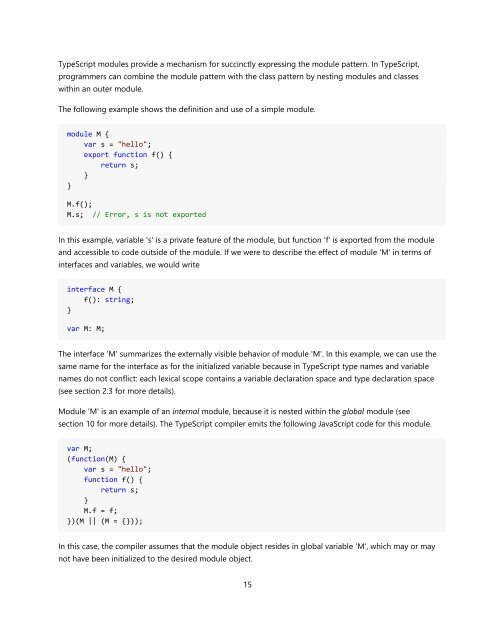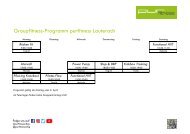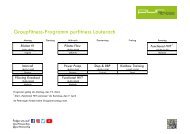TypeScript Language Specification v1.5
TypeScript Language Specification v1.5
TypeScript Language Specification v1.5
Create successful ePaper yourself
Turn your PDF publications into a flip-book with our unique Google optimized e-Paper software.
<strong>TypeScript</strong> modules provide a mechanism for succinctly expressing the module pattern. In <strong>TypeScript</strong>,<br />
programmers can combine the module pattern with the class pattern by nesting modules and classes<br />
within an outer module.<br />
The following example shows the definition and use of a simple module.<br />
module M {<br />
var s = "hello";<br />
export function f() {<br />
return s;<br />
}<br />
}<br />
M.f();<br />
M.s; // Error, s is not exported<br />
In this example, variable 's' is a private feature of the module, but function 'f' is exported from the module<br />
and accessible to code outside of the module. If we were to describe the effect of module 'M' in terms of<br />
interfaces and variables, we would write<br />
interface M {<br />
f(): string;<br />
}<br />
var M: M;<br />
The interface 'M' summarizes the externally visible behavior of module 'M'. In this example, we can use the<br />
same name for the interface as for the initialized variable because in <strong>TypeScript</strong> type names and variable<br />
names do not conflict: each lexical scope contains a variable declaration space and type declaration space<br />
(see section 2.3 for more details).<br />
Module 'M' is an example of an internal module, because it is nested within the global module (see<br />
section 10 for more details). The <strong>TypeScript</strong> compiler emits the following JavaScript code for this module.<br />
var M;<br />
(function(M) {<br />
var s = "hello";<br />
function f() {<br />
return s;<br />
}<br />
M.f = f;<br />
})(M || (M = {}));<br />
In this case, the compiler assumes that the module object resides in global variable 'M', which may or may<br />
not have been initialized to the desired module object.<br />
15


















